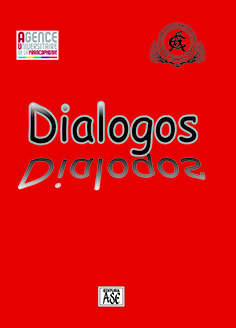EDITORIAL POLICY
Contributions
Dialogos is a thematic journal.
The green issues (odd numbers) publish articles on:
-literature;
-intercultural communication.
The orange issues (even numbers) publish articles on:
-theoretical linguistics;
-applied linguistics;
-modern language teaching.
All issues include a column “Reflexions”. Here we publish articles on literature/intercultural communication or linguistics/language teaching which are not connected to the theme of the respective issue.
Also, all issues include a column « Proposals for reading » where we publish reviews of books connected to the theme of the respective issue.
Article submission
Dialogos welcomes articles written in French, English, German, Spanish, Italian and Romanian. All articles must be original and never having been published before. Dialogos also accepts articles presented at conferences, provided they have not been published in the conference proceedings.
Submission requirements:
Title. Bold, Times New Roman 14
Author.
Author’s first name, surname (capital letters), department,
university, e-mail address.
Abstract. An
English abstract of maximum 10 lines should be submitted
together with the article.
Keywords. A
list of maximum 5 keywords should be placed below the abstract
and separated by a semi-column.
Presentation. Articles
should be word-processed in Times New Roman font, size 12, with
single-spaced paragraphs. In general, articles should not be
longer than 12 pages.
Acknowledgement of sources. All
information and ideas taken from other sources (books, articles,
papers written by colleagues, conference presentations, the
Internet) should be acknowledged.
Quotations. Quotations
should be enclosed in double quotation marks. References should
include the author's last name, the year of publication, and, if
the case, page numbers, as in the following example:
- e.g. “communication is mainly a process
of organizing reality through perception and symbols." (Myers
and Myers, 1990 : 33)
- Longer quotations should be given in italics,
in separate paragraphs.
- Generally speaking, references and comments
should be incorporated in the text; but, when necessary,
footnotes may be used for special comments.
References.
References containing all the works referred to in the
text should be included at the end of the article, in
alphabetical order, following this style:
- Reference to a book:
MOLE, John (2005), Mind Your Manners.
Managing Business Culture in the New Global Europe, Nicholas
Brealy Publishing,
-Reference to an article:
NUNN, Roger (2005), "From Defining
When submitting the article, the author will sign an acceptance of responsibility.
Before publication, the article will be read by two peer-reviewers who will fill
the form below. The author is entitled to see the peer-reviewers’ remarks and, possibly amend his/her article.
Dialogos practices double blind peer review. The author’s name is deleted from the article before the article is sent to the peer reviewers. The peer reviewers’ names are also deleted from the duly completed peer review form and, then, such forms are sent to the author to make the modifications and the corrections required and to send back the final article to the address mentioned on the journal’s site or to that of the editor in chief.
Peer reviewers are specialized in the language and the topic of the articles they review and have no conflict of interests with the author whose article they examine.
Author's benefits
All the articles published can be found on Dialogos site for reading and citation. The author’s name, as well as an abstract and the key words of his/her article can be found in the data base CEEOL, as well as in the other international data bases where Dialogos is indexed.
All the issues on paper of Dialogos, which are identical to Dialogos on line, can be found in the inventory of the Library of Congress, Washington DC, USA, as well as in those of various Romanian libraries.
If the authors wish so, they will receive a print copy of the issue where their article has been publishes free of charge.
